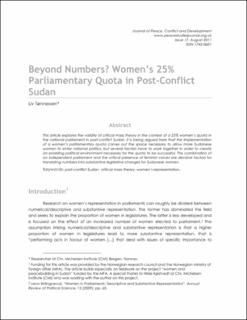| dc.contributor.author | Tønnessen, Liv | |
| dc.date.accessioned | 2022-11-03T17:37:13Z | |
| dc.date.available | 2022-11-03T17:37:13Z | |
| dc.date.issued | 2011-08-01 | |
| dc.identifier | oai:www.cmi.no:4102 | |
| dc.identifier.citation | in Journal of Peace, Conflict and Development vol. 17 pp. 43-62 | |
| dc.identifier.issn | 1742-0601 | |
| dc.identifier.uri | https://hdl.handle.net/11250/3029987 | |
| dc.description.abstract | This article explores the validity of critical mass theory in the context of a 25% women’s quota in the national parliament in post-conflict Sudan. It is being argued here that the implementation of a women’s parliamentary quota carves out the space necessary to allow more Sudanese women to enter national politics, but several factors have to work together in order to create an enabling political environment necessary for the quota to be successful. The combination of an independent parliament and the critical presence of feminist voices are decisive factors for translating numbers into substantive legislative changes for Sudanese women. | |
| dc.language.iso | eng | |
| dc.relation | Peace, Conflict and Development | |
| dc.relation.ispartof | Peace, Conflict and Development | |
| dc.relation.ispartofseries | Peace, Conflict and Development vol. 17 | |
| dc.relation.uri | https://www.cmi.no/publications/4102-beyond-numbers-womens-25-parliamentary-quota-sudan | |
| dc.subject | Post-Conflict Sudan | |
| dc.subject | Critical Mass Theory | |
| dc.subject | Women's Representation | |
| dc.subject | Sudan | |
| dc.title | Beyond numbers? Women's 25% parliamentary quota in post-conflict Sudan | |
| dc.type | Journal article | |
| dc.type | Peer reviewed | |
| dc.identifier.cristin | 834270 | |
